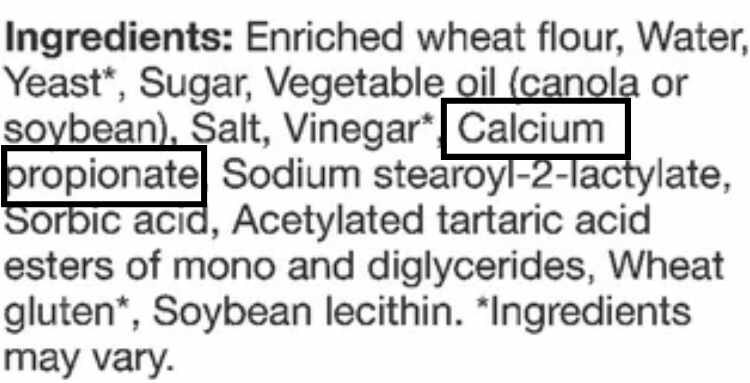If you’re an avid food label reader, you’ve likely come across the ingredient calcium propionate and wondered what it was. We’re breaking down everything you need to know about this common preservative to help you make educated choices at the grocery store. From its function in food to health implications, continue reading for everything you need to know before you shop.
What is Calcium Propionate?
Calcium propionate is a calcium salt that comes from propionic acid. It is a widely used preservative found in store-bought breads and other baked goods. It is made by neutralizing propionic acid with calcium hydroxide, which causes the formation of calcium propionate as white crystals. These crystals are filtered, spray-dried, and packed for industry use.
Calcium propionate is approved for use as a preservative in Canada, the United States, and Europe. Based on the research available and the amounts typically consumed by consumers, it holds the ranking of GRAS (Generally Recognized as Safe).

Why is Calcium Propionate Added to Food?
Calcium Propionate is a preservative used in store-bought foods. You’ll find it in bread products and other baked goods because it is effective against the organism Bacillus mesentericus which is responsible for causing mould in these products. It is often preferred over other types of propionate salts as it also contributes added calcium to the product, giving the end product the added benefit of a higher nutrient content. In addition, less calcium propionate is required compared to other propionic acids to be effective as a preservative.
Is Calcium Propionate Bad for Your Health?
When we eat a food that contains calcium propionate, it is absorbed in the human gastrointestinal tract and metabolized. About 80% of calcium propionate is quickly metabolized into carbon dioxide and removed from our system through our breath.
Animal Studies
Research available investigating the safety of calcium propionate is limited, and most are animal studies with acute (short-term) exposure. These animal studies have investigated the general effects of consuming high doses of the preservative, its consequences for liver health, and its impact on growth rates. Most of these studies have failed to identify any toxic effects of calcium propionate, even in high doses.
The few studies that have found toxic effects of calcium propionate consumption in animals cannot necessarily be generalized to humans. For example, the European Health Union published its review of the safety of propionic acid in food. One study included in their review observed lesions in the forestomach of rats with repeated high intakes of the preservative. They concluded that this is not a concern for humans as we do not have a forestomach. They also noted that the amount of calcium propionate used in these studies is much higher than humans consume as part of a typical diet.
Potential Impact Blood Sugars
More recently, a 2017 study investigated the effects of calcium propionate on post-meal insulin levels in healthy adults. Participants were given a mixed meal containing 1g of calcium propionate, the amount typically consumed in a meal with processed food. Researchers found that the meal containing the preservative led to a significant rise in both glucagon (a hormone that increases blood sugar levels) and insulin (a hormone that decreases blood sugar levels) and reduced insulin sensitivity (meaning your body does not respond to insulin as effectively as it normally would, which increases the risk of blood sugars remaining high).
Researchers noted that this effect was acute and does not reflect the impact of chronic calcium propionate exposure. More research is needed to identify what impact this would have, if any, on diabetes risk or other long-term health complications. However, it does indicate that bread and baked goods containing preservatives may be more likely to increase blood sugars compared to those without.

Bottomline: Is calcium Propionate bad for you?
I recommend proceeding with caution when it comes to products with calcium propionate. While it does not appear that this ingredient is toxic in amounts typically consumed in the diet, it is generally found in more processed foods which are associated with higher rates of chronic disease such as obesity, heart disease, and diabetes.
The disease risk associated with processed foods is usually attributed to the poor nutrient quality of these foods, such as lower amounts of fiber and higher amounts of processed fats and sugar. However, we don’t fully understand the impact of specific food ingredients or processing methods on the risk of chronic disease. Though we don’t yet have long-term research to confirm this, the effect of calcium propionate on insulin activity indicates that processed foods may increase the risk of chronic disease beyond the unfavourable macronutrient content.
Your Overall Dietary Pattern Matters Most!
When it comes to making healthy choices, always remember that your health is impacted most by your overall dietary pattern, not one single food choice. Calcium propionate is found in breads and baked goods, so here are a couple of things to consider:
- Try to choose higher fibre bread, like these ones, which will have a favorable effect on blood sugars.
- When it comes to other baked goods such as store-bought muffins or pastries, try to limit your overall intake and avoid including these items in your daily routine.
Related Posts
- Is Maltitol Bad for You? Food Ingredient Review
- Is Xanthan Gum Safe? Ingredient 101
- Lecithin – Food Ingredient Review
Sources:
- U. S Food & Drug Administration. Code of Federal Regulations, Title 21, volume 3. Sec. 184.1221 Calcium propionate, 2023.
- List of Permitted Food Preservatives, Health Canada, 2022.
- Scientific Opinion of the Re-Evaluation of propionic acid, sodium, calcium, and potassium propionate as food additives. European Food Safety Authority, 2014.
- Tirosh et al., The short-chain fatty acid propionate increases glucagon and FABP4 production, impairing insulin action in mice and humans. Sci. Transl. Med. 11, eaav0120 (2019).
- Rekha S. Singhal, Pushpa R. Kulkarni. Preservatives – Permitted Preservatives – Propionic Acid, Encyclopedia of Food Microbiology, 1999. https://doi.org/10.1006/rwfm.1999.2085


